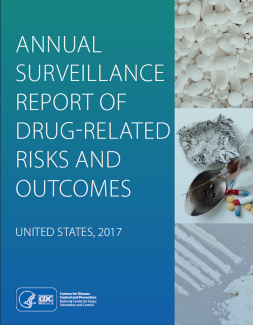Annual Surveillance Report of Drug-Related Risks and Outcomes
Submitted by Jose Luis Vazquez Martinez
- 16 April 2018

This report presents information on four types of outcomes from the four different data sources:
- Opioid prescribing, 2006-2016, from QuintilesIMS Health®
- Drug use, misuse, and substance use disorder, 2014-2015, from the National Survey on Drug Use and Health (NSDUH), a product of the Substance Abuse and Mental Health Services Administration
- Nonfatal overdose hospitalizations and emergency department (ED) visits, 2014, from the Healthcare Cost and Utilization Project (HCUP), a product of the Agency for Healthcare Research and Quality (AHRQ)
- Drug overdose mortality, 1999-2015, from the National Vital Statistics System (NVSS) Mortality Component, maintained by the National Center for Health Statistics, CDC
Conclusions
The data from these four sources suggest the following conclusions:
- Through 2015, drug overdose remained a large and growing public health crisis in the United States.
- Prescription opioid pain relievers were formerly driving the crisis, but by 2015 they shared equal measure with heroin, synthetic opioids other than methadone (mostly illicit fentanyl), and—increasingly—cocaine and methamphetamines.
- The leveling off and declines in opioid prescribing rates since 2012 and high-dose prescribing rates since 2009 suggest that healthcare providers have responded, becoming more cautious in their opioid prescribing practices.
- Additional measures are now urgently needed to address a diverse and evolving array of drug types.
Suggested citation: Centers for Disease Control and Prevention. Annual Surveillance Report of Drug-Related Risks and Outcomes — United States, 2017. Surveillance Special Report 1. Centers for Disease Control and Prevention, U.S. Department of Health and Human Services. Published August 31, 2017.